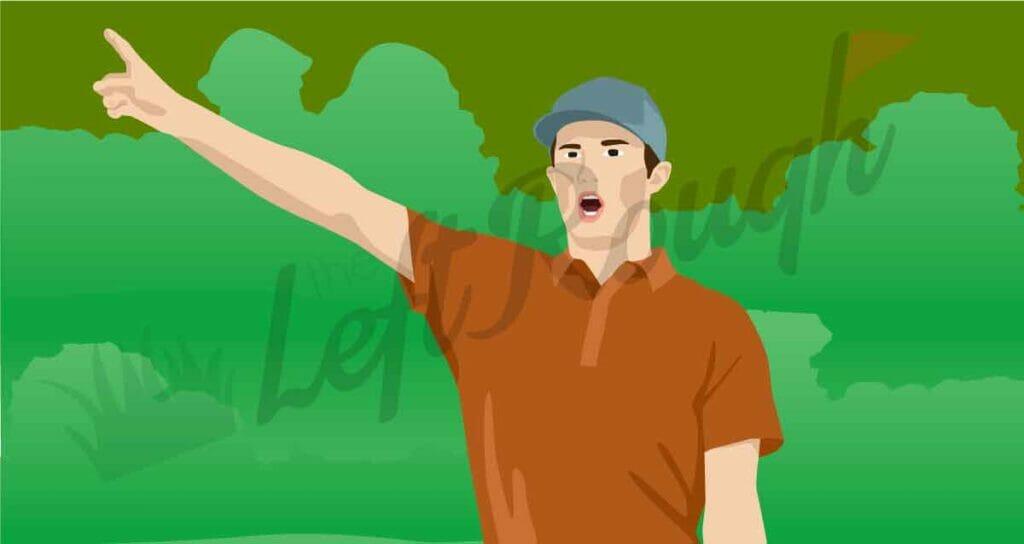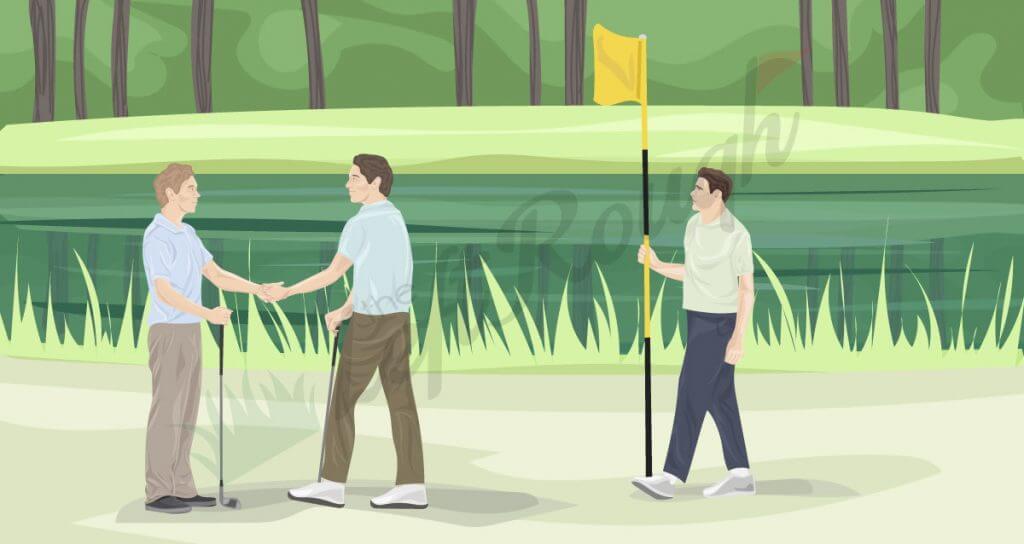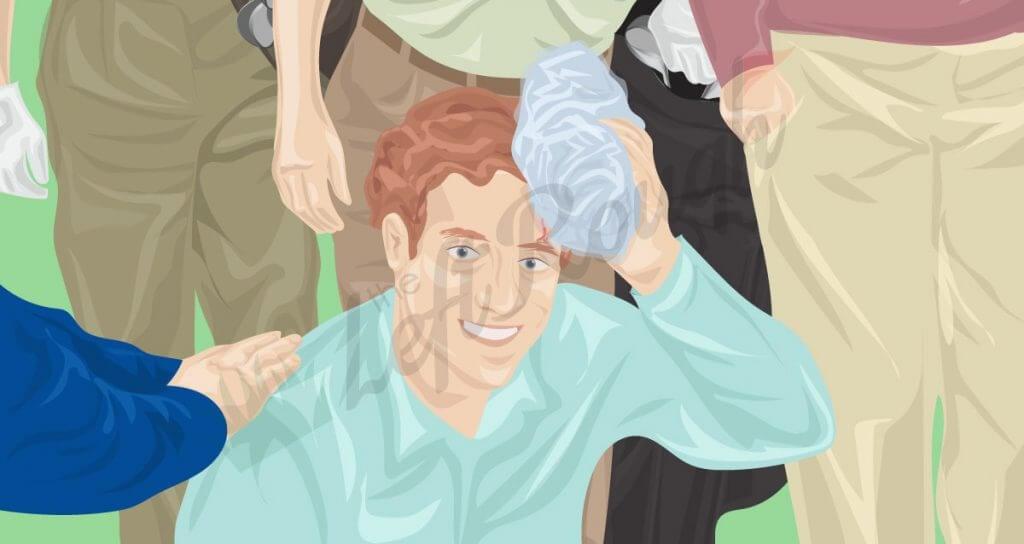One of the first things you learn in golf isn’t necessarily about the swing itself.
Instead, it’s a piece of etiquette that might save your life or the life of another golfer. It might sound drastic but it’s true.
You are viewing: Why Do Golfers Yell Four
Anybody who’s ever played this game has heard the word “FORE” and immediately ducked behind a tree or golf cart. Or, put their hands over their head like they were about to receive a right hook from Mike Tyson.
It is common knowledge that when you hear the word fore, you duck in golf. This golf term means that a ball is coming near you or your group and it’s a warning to get out of the way.
But have you ever wondered why we yell fore and not watch out, get out of the way, or some other term? If so, keep reading to learn more about the history of golf and some other tips to help your golf etiquette as a beginner golfer.
Yelling Fore in Golf
While you might know the term fore all too well on the links, chances are you don’t know where it originated. Let’s take a look at the history of golf to learn more about one of the most common golf terms out there.
The prefix “fore” (which originated in the Middle Ages) indicates that something is ahead or in front of you. If you look back to when golf was just starting out in the 1700s-1800s, caddies were very much a part of the game. It’s not like today where most golfers take carts and caddies are reserved for professional golf or bucket list courses.
Back then, caddies would carry bags but also help see where a ball landed to avoid lost balls. Since golf courses weren’t maintained like they are today and golf balls were expensive, this was a crucial part of their job. Sometimes they would even have forecaddies whose sole job was to locate golf balls off the tee.
A forecaddie would walk ahead of the group and get into position to locate each tee ball. As players would hit toward them, they would yell “forecaddie” to let them know they were in danger of being struck. But as you can imagine, yellowing that loud for a word that long wasn’t convenient.
Thus, golfers and caddies shortened to simply yell, “FORE.” Now, it’s a term that every single golfer knows (or should know).

When to Yell Fore
Now that you know about the history of the word fore in golf, let’s get into when you need to shout this four-letter word.
Anytime you hit a shot near a player or group of golfers, yell fore – loudly. Of course, it might interrupt someone on a nearby hole but it’s worth it.
Read more : Why Is It Called The Beaver Moon
As someone who’s played for 20+ years, I can say nothing makes me more angry than someone who nearly hits you and doesn’t give you a warning!
In fact, I was with a group once who hit a bad shot and we had no clue a group was behind a group of trees. As we drove up we saw a guy who looked like he was ready to fight everyone in our group.
He raised his shirt up to show us the nasty red mark from a ball that struck him directly in the chest. Needless to say, tensions were high but we apologized and moved on without a back nine brawl. Obviously, I don’t want that type of incident for you.
If your ball is in the direction of fellow players, you must yell fore!
It’s better safe than sorry as I’ve seen some scary incidents on the golf course. Also, it’s common to shout “fore left” or “fore right” to give the golfer a heads-up on an adjacent fairway.
Finally, make sure you always wait until the group is done with their second shot in the fairway or in their carts before hitting. Too many golfers get impatient with the slow pace of play and can lead to not waiting for others to finish. This is not proper golf etiquette and a good way to make other golfers quite angry.
What to Do When You Hear “FORE”
If you hear fore, typically your fight or flight instinct kicks in and the immediate reaction is to move quickly. It’s best to always cover your head and try to get behind cover to avoid an incoming ball. This could also mean diving in the golf cart, getting behind a group of trees, or other objects to avoid an errant shot.
It’s always best to duck, turn your head away, and protect your head above all else from a wayward shot. If you get hit with a golf ball anywhere other than your head it’ll sting for a bit but it’s not the end of the world.
However, if a ball soaring at 100 mph hits you in the head, it can ruin the round quickly. Protect your head above all else and always turn away from where you think the ball is going to land.

FAQs About Fore and Other Golf Terms
Do you have more questions about golf etiquette, why golfers shout fore and other golf terms? If so, keep reading to learn more now and play golf like an experienced player.
Do pro golfers yell fore?
Yes, professional golfers are just like everyday golfers yelling the word fore after an errant shot. In fact, they need to yell and warn patrons much more than the everyday golfer. Don’t get me wrong, everyone should yell but these guys hit it with such speed that when it does hit a gallery member it can cause injury!
It’s not uncommon to see people in the gallery sustaining bad injuries after getting struck by an errant tee shot. Luckily, the pro who is responsible will apologize and sign a golf ball or glove as a way to make up for it. The people in the gallery know this is a risk but still show up anyway!
Are forecaddies still a thing?
Read more : Why Did Elie Wiesel Write Night
While they aren’t as common as they once were, yes, they’re still a part of golf. They’re not at every golf course and typically only at high-end courses and/or country clubs.
For example, when our group played at a course in Mexico we hired a forecaddie to help us locate golf balls. He also helped read greens and provide insight on the golf course too.
To learn more about the role of a forecaddie in golf, click here.

What happens if you get hit with a golf ball?
If you’ve ever been on the receiving end of a “fore” gone wrong, you know it’s painful. Depending on where you get hit (hopefully it’s not your head) it tends to sting like crazy. I’ve been struck a few times and can say it’s more shock than pain but it might linger for a few minutes.
Where did shouting fore in golf come from?
Shouting fore is a shortened version of the word forecaddie.
In the 1700s and 1800s golfers almost always used caddies and forecaddies to help them navigate the golf course. These guys would walk ahead of the group in order to find tee shots.
Eventually, the word caddie was dropped from the word and golfers just yelled fore instead.
Is a forecaddie a spotter?
Yes, in professional golf forecaddies are known as spotters in professional tournaments. These are typically volunteers for the event who sign up to get inside the ropes of a major sporting event. While they’re normally not paid they do get meals, apparel, and a great experience.
Why do golfers say bite?
It’s common for golfers to talk to their golf ball in the air (somehow thinking it’ll listen) and bite is a common slang. Asking a golf ball to “bite” is asking for it to sit quickly or get down. If you hit a shot too good or take too much club you might ask it to bite so it stays on the green.
The opposite is asking for your golf ball to “Go” as you think it’s going to end up short of your target.
Final Thoughts on Good Etiquette in Golf
Now you have a history of one of the most common golf terms in this sport.
While forecaddies aren’t as common as they once were to see where the ball lands, make sure to always keep this best practice in golf. Wayward shots happen and always will in golf so make sure to warn other golfers.
If you hit a golf shot that is anywhere near a player or group, always yell fore! If you hear the word, make sure to protect yourself and get out of the way from friendly gunfire fast.
Source: https://t-tees.com
Category: WHY
